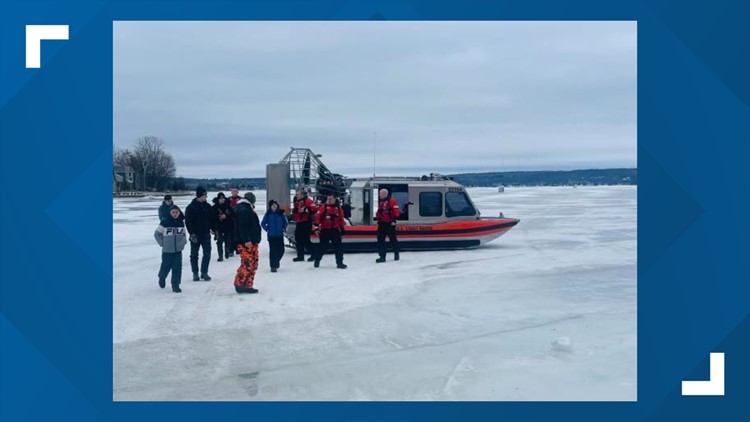SEBEWAING, Mich. — Monday, the U.S. Coast Guard saved two dozen people stranded on ice floes, or a sheet of floating ice, on the Great Lakes.
The Coast Guard responded to two reports of people stranded on the ice in Michigan and Wisconsin.
The first report came in to the Sturgeon Bay Station, located near Green Bay, Wisconsin. Coast Guard crew members from that station responded to 11 people stranded on an ice floe off of Sherwood Point.
Five adults and six children were safely transported off the ice floe and back to shore by Coast Guard crews and members of partner agencies.
Following that rescue, the Coast Guard received a report of people stranded on an ice floe and in the water in Saginaw Bay off of Sebewaing, Michigan.
Coast Guard crews from the Saginaw River Station, Air Station Detroit and Air Station Traverse City responded to the call along with other partner agencies.
A total of 14 people were rescued from the ice floe by first responders. The victims were in varying conditions, including two victims requiring care for hypothermia.
“The two large ice rescue cases highlight the unpredictability of the ice on the Great Lakes, especially with fluctuating temperatures,” said Capt. Timothy Holt, Chief of Incident Management for the Ninth District. “We appreciate the swift response from all agencies involved and recovering everyone safely.”
The Coast Guard is reminding people to follow three guidelines when thinking about heading out on the water:
- Take precautions, not chances. The risk of death from accidental immersion during cold weather seasons is higher than in warm seasons. The water is colder and survival time is greatly diminished.
- Dress for the water temperatures. Cold water lowers body heat dramatically faster than cold air. Even if you are not planning on entering the water, the possibility of that happening is very real.
- Never leave without a VHF-FM radio or personal locator beacon and always be sure to tell someone where you are going, when you expect to return and advise them of any changes in the plan. Every minute counts in a cold-water environment, and preparation may mean the difference between life and death.
An unusually mild winter in terms of temperature have made for very low ice coverage on the Great Lakes this year. You should always check ice conditions before attempting to head out on the water.
►Make it easy to keep up to date with more stories like this. Download the 13 ON YOUR SIDE app now.
Have a news tip? Email news@13onyourside.com, visit our Facebook page or Twitter. Subscribe to our YouTube channel.



